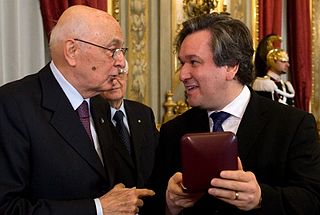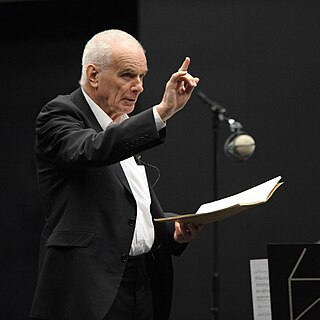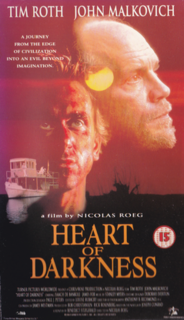Related Research Articles

Heart of Darkness (1899) is a novella by Polish-English novelist Joseph Conrad. It tells the story of Charles Marlow, a sailor who takes on an assignment from a Belgian trading company as a ferry-boat captain in the African interior. The novel is widely regarded as a critique of European colonial rule in Africa, whilst also examining the themes of power dynamics and morality. Although Conrad does not name the river where the narrative takes place, at the time of writing the Congo Free State, the location of the large and economically important Congo River, was a private colony of Belgium's King Leopold II. Marlow is given a text by Kurtz, an ivory trader working on a trading station far up the river, who has "gone native" and is the object of Marlow's expedition.
Kurtz is a central fictional character in Joseph Conrad's 1899 novella Heart of Darkness. A trader of ivory in Africa and commander of a trading post, he monopolises his position as a demigod among native Africans. Kurtz meets with the novella's protagonist, Charles Marlow, who returns him to the coast via steamboat. Kurtz, whose reputation precedes him, impresses Marlow strongly, and during the return journey, Marlow is witness to Kurtz's final moments.

The Royal Opera House (ROH) is an opera house and major performing arts venue in Covent Garden, central London. The large building is often referred to as simply Covent Garden, after a previous use of the site. It is the home of The Royal Opera, The Royal Ballet, and the Orchestra of the Royal Opera House. The first theatre on the site, the Theatre Royal (1732), served primarily as a playhouse for the first hundred years of its history. In 1734, the first ballet was presented. A year later, the first season of operas, by George Frideric Handel, began. Many of his operas and oratorios were specifically written for Covent Garden and had their premieres there.

Headhunter is a novel by Timothy Findley. It was first published by HarperCollins in 1993.

Sir Antonio Pappano is an English-Italian conductor and pianist. He is currently music director of the Royal Opera House and of the Orchestra dell'Accademia Nazionale di Santa Cecilia. He is scheduled to become chief conductor of the London Symphony Orchestra in 2024.

Tarik Hamilton O'Regan is a British and American composer. His compositions number over 100 and are partially represented on 43 recordings which have been recognised with two Grammy nominations. He is also the recipient of two British Composer Awards. O'Regan has served on the Faculties of Columbia University as a Fulbright Chester Schirmer Fellow, The Radcliffe Institute of Harvard University as a Radcliffe Fellow, Yale University, Trinity College in the University of Cambridge, Rutgers University, and the Institute for Advanced Study in Princeton as Director's Visitor.
Heart of Darkness is an 1899 novella by Joseph Conrad.

Owen Wingrave, Op. 85, is an opera in two acts with music by Benjamin Britten and libretto by Myfanwy Piper, after a short story by Henry James. It was originally written for televised performance.
David Bruce is a British composer of contemporary classical music and a YouTuber.

The American Opera Project (AOP) is a professional opera company based in Brooklyn, New York City, and is a member of Opera America, the Fort Greene Association, the Downtown Brooklyn Arts Alliance, and the Alliance of Resident Theatres/New York (A.R.T./NY). The company's primary mission is to develop and present new operatic and music theatre works and has gained a reputation for the "rarefied range" of the projects it fosters. AOP was founded in 1988 by Grethe Barrett Holby who served as Artistic Director of AOP from 1988 until 2001, at which point Charles Jarden became the company's Executive Director and Steven Osgood the company's Artistic Director. Steven Osgood left the post of Artistic Director in 2008 to pursue conducting full-time but remains the Artistic Director for AOP's "Composers & the Voice" program.

Apocalypse Now is a 1979 American epic psychological war film directed and produced by Francis Ford Coppola. It stars Marlon Brando, Robert Duvall, Martin Sheen, Frederic Forrest, Albert Hall, Sam Bottoms, Laurence Fishburne, and Dennis Hopper. The screenplay, co-written by Coppola and John Milius with narration written by Michael Herr, is loosely based on the 1899 novella Heart of Darkness by Joseph Conrad, with the setting changed from late 19th-century Congo to the Vietnam War. The film follows a river journey from South Vietnam into Cambodia undertaken by Captain Benjamin L. Willard, who is on a secret mission to assassinate Colonel Kurtz, a renegade Army Special Forces officer accused of murder and who is presumed insane.
Alan Oke is a British tenor. Born in London and raised in Scotland, he studied both at the Royal Scottish Academy of Music and Drama in Glasgow and with Hans Hotter in Munich.
Edward Dick is a British theatre director.
ROH2 was the contemporary arm of the Royal Opera House until 2012, commissioning and producing dance and contemporary opera works in the Linbury Studio Theatre, Clore Studio Upstairs, Paul Hamlyn Hall and various other locations situated both within the Royal Opera House and outside. ROH2 also provided additional artistic resource to partners and associate artists in order to help the organisation realise its strategic aims. ROH2 focused on developing the art forms, creating opportunities for emerging artists and attracting new and diverse audiences to the Royal Opera House. From the start of the 2012/13 season the work of ROH2 has been undertaken by the 'studio programmes' of the Royal Opera and the Royal Ballet.

Kommilitonen! is an opera by Sir Peter Maxwell Davies. The libretto is by David Pountney, who was also the director of the premiere performances in March 2011.
Ghost Patrol is a one-act chamber opera composed by Stuart MacRae to an English-language libretto by Louise Welsh. A co-commission by Scottish Opera and Music Theatre Wales, it premiered on 30 August 2012 at the Edinburgh Festival.

Heart of Darkness is a 1993 television adaptation of Joseph Conrad’s famous 1899 novella written by Benedict Fitzgerald, directed by Nicolas Roeg, and starring Tim Roth, John Malkovich, Isaach De Bankolé and James Fox. The show is the third screen adaptation of the novella, following a 1958 television adaptation for the anthology series Playhouse 90 starring Boris Karloff, and 1979's Apocalypse Now with Marlon Brando, which loosely adapted it and updated it to the Vietnam War.
The Yellow Sofa is an opera by the British composer Julian Philips, with a libretto by writer and director Edward Kemp, based on the novella Alves & Co. by Eça de Queiros.
Into the Little Hill is a 2006 chamber opera by British composer George Benjamin.

"Heart of Darkness" was an American television play broadcast on November 6, 1958, as part of the CBS television series, Playhouse 90. It was the seventh episode of the third season of Playhouse 90. The play was adapted from Joseph Conrad's short story, Heart of Darkness.
References
- 1 2 3 Heart of Darkness production details, Royal Opera House, archived from the original on 2011-10-20
- ↑ Joshua Kosman (2 May 2015), "Opera review: A shadowy plunge into Heart of Darkness", San Francisco Chronicle
- 1 2 Tom Service (31 October 2011), "Off the map: Heart of Darkness gets the opera treatment", Guardian
- 1 2 3 4 Programme booklet for Opera East/ROH2 premiere (1 November 2011), "Heart of Darkness programme notes by Tarik O'Regan and Tom Phillips", reproduced at www.heartofdarknessopera.com
- ↑ Neil Norman (2 November 2011), "Prospect recommends: Heart of Darkness", Prospect
- ↑ Suite from Heart of Darkness first London performance, Cadogan Hall
- ↑ Anna Picard (6 November 2011), "Heart of Darkness: Tarik O'Regan's Conrad adaptation is an audacious, handsome debut" , Independent on Sunday, archived from the original on 2022-05-09
- ↑ Stephen Pritchard (5 November 2011), "Heart of Darkness", Observer
- ↑ Jeanne Whalen (4 November 2011), "Pilgrimage Into a Dark Night of the Soul", Wall Street Journal
- ↑ John Allison (6 November 2011), "Heart of Darkness", Sunday Telegraph
- ↑ Claire Seymour (4 November 2011), "Heart of Darkness, Royal Opera", Opera Today
- ↑ Mark Valencia (5 November 2011), "Tarik O'Rega's Heart of Darkness (Opera East at Linbury Studio Theatre)", Classical Source
- ↑ Mark Berry (3 November 2011), "Tarik O'Regan, Heart of Darkness: An Emotionally Honest Collaboration", Scene and Heard International
- ↑ Rupert Christiansen (3 November 2011), "Heart of Darkness, Royal Opera House, review", Telegraph
- ↑ George Hall (2 November 2011), "Heart of Darkness – review", Guardian
- ↑ Michael White (2 November 2011), "Turning a classic book into a chamber opera: Heart of Darkness opens downstairs at the ROH", Telegraph, archived from the original on 5 November 2011
- ↑ Anna Picard (18 December 2011), "Arts review of 2011" , Independent on Sunday, archived from the original on 2022-05-09
- ↑ Fiona Maddocks (11 December 2011), "The best classical music of 2011", Observer
- ↑ South Bank Sky Arts Awards 2012, Sky Media